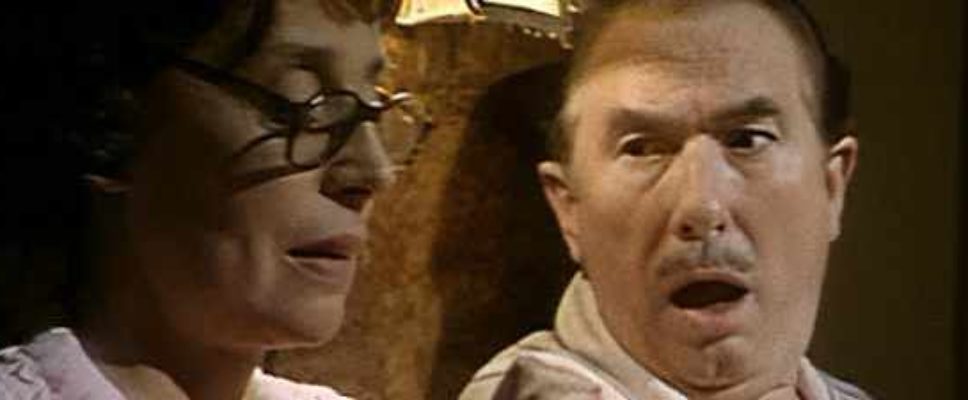Teresa Reviews “The Case of the Middle-Aged Wife” (1982)
Teresa reviews “The Case of the Middle-Aged Wife” (1982), the first episode from “The Agatha Christie Hour.”
Fidelity to text: 4 gigolos
![]()
Everything the text alludes to is onscreen with added characters to better dramatize the storyline.
Quality of movie on its own: 5 gigolos
![]() This had everything, including a big band with a crooner, and sly allusions to Archie Christie’s affair with Nancy Neele.
This had everything, including a big band with a crooner, and sly allusions to Archie Christie’s affair with Nancy Neele.
Read more of Teresa’s Agatha Christie movie reviews at Peschel Press.
Also, follow Teresa’s discussion of these movies on her podcast.

Fast-forward two years to the debut of “The Agatha Christie Hour.” It’s ten episodes in all and uses lesser-known short stories, not all of them mysteries. These stories demonstrate Agatha’s range and how skillfully she handled the human heart. These stories also demonstrate that if you, dear reader, stick only to Poirot and Marple, you’re missing out on a lot of good reading.
Are these mysteries? Not really, unless you consider humans to be mysteries at heart. Are they good stories that deserve to be reread? You bet. It makes me wonder why there’s no complete collection of her short stories, other than one for Poirot and one for Marple. Agatha wrote in other genres than mysteries. She liked a touch of the paranormal as well as some romance. Thus, when the weekly TV show was developed, there was plenty of material to choose from and most of it was unknown to the audience.

We meet Maria Packington and her husband, George. They’re well-enough off to afford a housemaid, yet Maria is dowdy. They argue over George spending long evenings entertaining clients.
Maria knows who he’s entertaining and it’s not businessmen. No, it’s his cheap dyed-blonde tart of a secretary, Nancy Purvis. The short story doesn’t give the secretary a name but the screenwriter did! Nancy. Nancy the secretary. Nancy the husband-poacher. Nancy, who’s no better than she should be. Now why does that ring a bell? Nancy Neele didn’t behave like Nancy Purvis but the connection is there if you want it.

This Nancy isn’t putting out. She doesn’t have to. That leaves her more time for her own boyfriend, whom George knows nothing about. But I bet Miss Draper does.
Miserable Maria spots Parker Pyne’s advert and consults with him. He persuades her to take a flier to the tune of two hundred guineas, up-front. Maria is bright enough to be wary and desperate enough to accept. The makeover comes next. The story does note that Maria pays for the makeover and new wardrobe. Parker Pyne also introduces Maria to Claude Luttrell.


She upset Claude so much that he doesn’t just refuse Maria’s offer of a gold cigarette case (which can be easily pawned). He tells Parker Pyne that he doesn’t know if he can continue being a gigolo. Parker Pyne scoffs. The short story gives more detail about Claude’s flexible morals, but both story and film agree. Maria is a wonderful woman and George should be grateful to have her.
There is so much to like about this episode. The scenes with Miss Lemon (before she went to work for Hercule Poirot) are amusing. The makeover is very well done. And then there’s the Aphrodite nightclub with a big band and a crooner to enhance your dancing pleasure. There’s a surprisingly large amount of music crammed into the episode, all of it carefully chosen to add another layer of meaning. Nick Curtis plays the crooner. He’s got a fabulous voice and manner. He sings twice in the nightclub and you hear his voice again on the radio, when George sits home alone and wondering where his life went wrong. You get two more jazz standards in the background, one during a restaurant scene and one for the big dance when George and Nancy meet Maria and Claude at the Aphrodite nightclub. Note how Claude looks happy with Maria but Nancy, when she’s unobserved, looks kind of bored with stuffy, middle-aged, paunchy George.
As I listened to that lovely, clever music, I wished for that kind of soundtrack in my own life. Classic jazz standards from the 1930’s never get old.
Should you watch? There’s no mystery. It’s a romance, something not normally associated with Agatha. Yes, you should. This was a lovely, heartwarming opening episode and an introduction to Agatha’s much larger body of work. Like Maria Packington, Agatha has unexpected depths that are worth exploring.
If you want to watch “The Agatha Christie Hour,” it’s available now on Amazon Prime.
Read more of Teresa’s Agatha Christie movie reviews at Peschel Press.

